高考状语从句讲解
- 格式:doc
- 大小:77.00 KB
- 文档页数:8
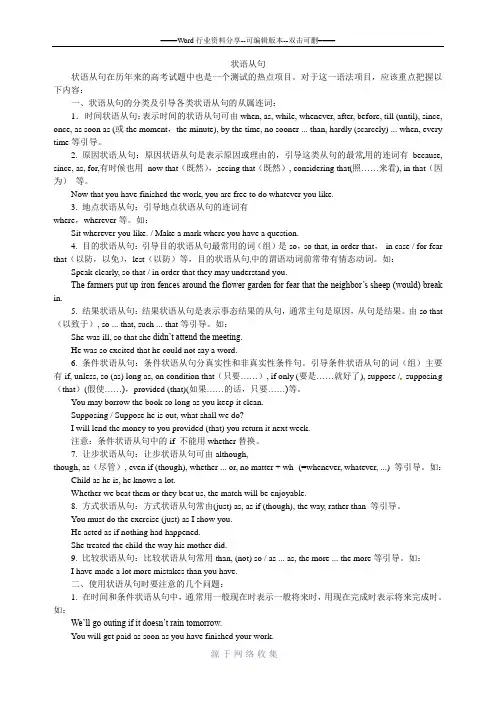
状语从句状语从句在历年来的高考试题中也是一个测试的热点项目。
对于这一语法项目,应该重点把握以下内容:一、状语从句的分类及引导各类状语从句的从属连词:1.时间状语从句:表示时间的状语从句可由when, as, while, whenever, after, before, till (until), since, once, as soon as (或the moment,the minute), by the time, no sooner ... than, hardly (scarcely) ... when, every time等引导。
2. 原因状语从句:原因状语从句是表示原因或理由的,引导这类从句的最常用的连词有because, since, as, for,有时候也用now that(既然),seeing that(既然), considering that(照……来看), in that(因为)等。
Now that you have finished the work, you are free to do whatever you like.3. 地点状语从句:引导地点状语从句的连词有where,wherever等。
如:Sit wherever you like. / Make a mark where you have a question.4. 目的状语从句:引导目的状语从句最常用的词(组)是so,so that, in order that,in case / for fear that(以防,以免),lest(以防)等,目的状语从句中的谓语动词前常带有情态动词。
如:Speak clearly, so that / in order that they may understand you.The farmers put up iron fences around the flower garden for fear that the neighbor’s sheep (would) break in.5. 结果状语从句:结果状语从句是表示事态结果的从句,通常主句是原因,从句是结果。
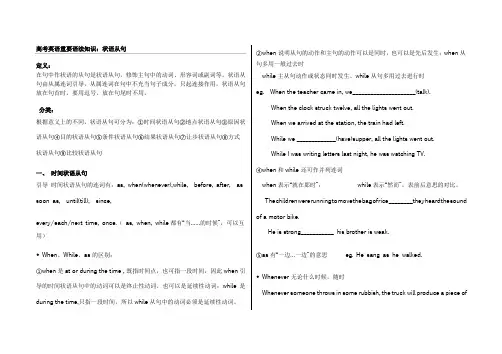
高考英语重要语法知识:状语从句定义:在句中作状语的从句是状语从句,修饰主句中的动词、形容词或副词等。
状语从句由从属连词引导,从属连词在句中不充当句子成分,只起连接作用,状语从句放在句首时,要用逗号,放在句尾时不用。
分类:根据意义上的不同,状语从句可分为:①时间状语从句②地点状语从句③原因状语从句④目的状语从句⑤条件状语从句⑥结果状语从句⑦让步状语从句⑧方式状语从句⑨比较状语从句一、时间状语从句引导时间状语从句的连词有:as, when(whenever),while, before, after, as soon as, until(till), since,every/each/next time, once.( as, when, while都有“当……的时候”,可以互用)◆When、While、as的区别:①when是at or during the time ,既指时间点,也可指一段时间,因此when引导的时间状语从句中的动词可以是终止性动词,也可以是延续性动词;while是during the time,只指一段时间,所以while从句中的动词必须是延续性动词。
②when说明从句的动作和主句的动作可以是同时,也可以是先后发生;when从句多用一般过去时while主从句动作或状态同时发生。
while从句多用过去进行时eg. When the teacher came in,we_____________________(talk).When the clock struck twelve,all the lights went out.When we arrived at the station,the train had left.While we _____________(have)supper,all the lights went out.While I was writing letters last night,he was watching TV.④when和while还可作并列连词when表示“就在那时”; while表示“然而”,表前后意思的对比。
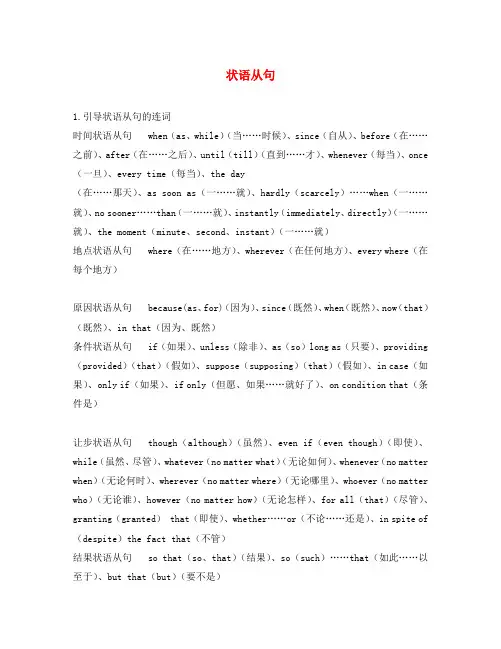
状语从句1.引导状语从句的连词时间状语从句when(as、while)(当……时候)、since(自从)、before(在……之前)、after(在……之后)、until(till)(直到……才)、whenever(每当)、once (一旦)、every time(每当)、the day(在……那天)、as soon as(一……就)、hardly(scarcely)……when(一……就)、no sooner……than(一……就)、instantly(immediately、directly)(一……就)、the moment(minute、second、instant)(一……就)地点状语从句where(在……地方)、wherever(在任何地方)、every where(在每个地方)原因状语从句because(as、for)(因为)、since(既然)、when(既然)、now(that)(既然)、in that(因为、既然)条件状语从句if(如果)、unless(除非)、as(so)long as(只要)、providing (provided)(that)(假如)、suppose(supposing)(that)(假如)、in case(如果)、only if(如果)、if only(但愿、如果……就好了)、on condition that(条件是)让步状语从句though(although)(虽然)、even if(even though)(即使)、while(虽然、尽管)、whatever(no matter what)(无论如何)、whenever(no matter when)(无论何时)、wherever(no matter where)(无论哪里)、whoever(no matter who)(无论谁)、however(no matter how)(无论怎样)、for all(that)(尽管)、granting(granted) that(即使)、whether……or(不论……还是)、in spite of (despite)the fact that(不管)结果状语从句so that(so、that)(结果)、so(such)……that(如此……以至于)、but that(but)(要不是)目的状语从句so that(so、that)(为了、以使)、lest(以防)、in case(以防、以免)、for fear that(以防)、in order that(为了)比较状语从句than(比……)、as……as(像……一样)、not so(as)……as (不像……一样)、(not)the same as((不)同……一样)、not so as(不如)、(not)such……as((不)如……)方式状语从句as(像……、犹如……)、as if(as though)(好像、仿佛)、the way(……的样子)2、时间状语从句(表示时间的状语从句)①when、whenever、while和aswhen意为“当……时候”,表示某个具体的时间。
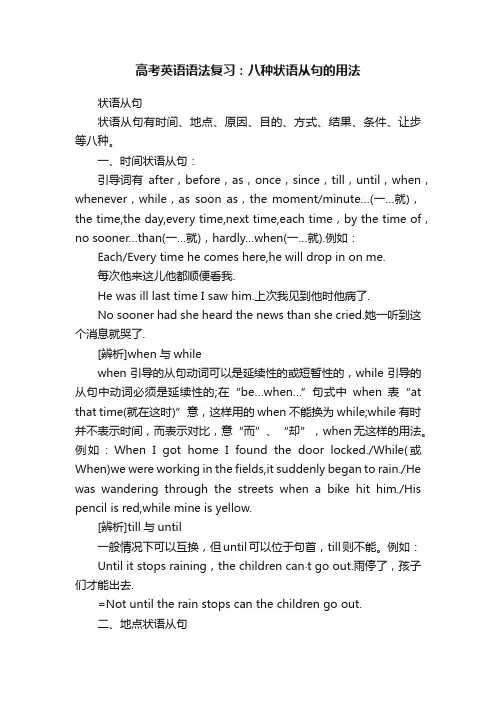
高考英语语法复习:八种状语从句的用法状语从句状语从句有时间、地点、原因、目的、方式、结果、条件、让步等八种。
一、时间状语从句:引导词有after,before,as,once,since,till,until,when,whenever,while,as soon as,the moment/minute…(一…就),the time,the day,every time,next time,each time,by the time of,no sooner…than(一…就),hardly…when(一…就).例如:Each/Every time he comes here,he will drop in on me.每次他来这儿他都顺便看我.He was ill last time I saw him.上次我见到他时他病了.No sooner had she heard the news than she cried.她一听到这个消息就哭了.[辨析]when与whilewhen引导的从句动词可以是延续性的或短暂性的,while引导的从句中动词必须是延续性的;在“be…when…”句式中when表“at that time(就在这时)”意,这样用的when不能换为while;while有时并不表示时间,而表示对比,意“而”、“却”,when无这样的用法。
例如:When I got home I found the door locked./While(或When)we were working in the fields,it suddenly began to rain./He was wandering through the streets when a bike hit him./His pencil is red,while mine is yellow.[辨析]till与until一般情况下可以互换,但until可以位于句首,till则不能。
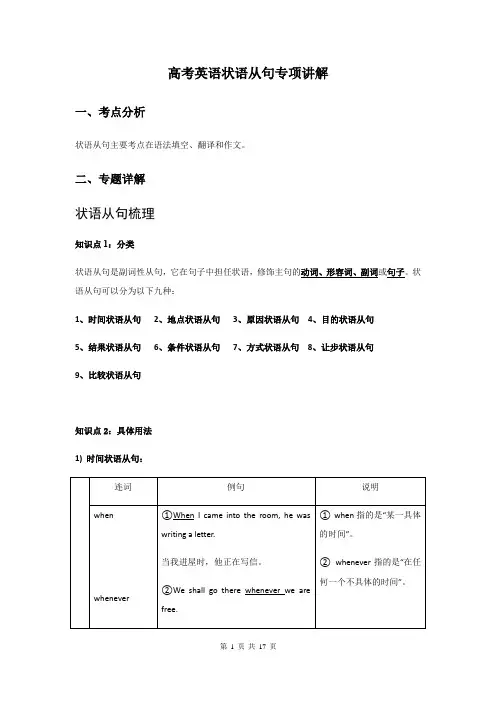
高考英语状语从句专项讲解一、考点分析状语从句主要考点在语法填空、翻译和作文。
二、专题详解状语从句梳理知识点1:分类语从句可以分为以下九种:1、时间状语从句2、地点状语从句3、原因状语从句4、目的状语从句5、结果状语从句6、条件状语从句7、方式状语从句8、让步状语从句9、比较状语从句知识点2:具体用法1) 时间状语从句:as soon as Hardly/scarcely had…whenNo sooner had …than….the moment.. the instant…the second…immediately directly…instantly…①As soon as I arrive in Shanghai, I’ll writeto you.我一到上海就给你写信。
② Hardly (scarcely) had I got homewhen it began to rain.我刚一到家就下雨了。
③No sooner had we got to the stationthan the train left.我们刚到车站,火车就走了。
④We had just begun the moment wewere told to stop.我们刚开始就被叫停。
⑤I felt cheerful immediately I heard thesong.我一听到这首歌就感到很愉快。
①hardly…when和nosooner…than的意义相当于as soon as,但只表示过去发生的事情,主句为过去完成时,从句为过去时,如hardly或no sooner位于句首时语气强,而且主句的谓语要用部分倒装。
②名词短语连词:“一……就……”主句+ the moment…从句主句+the instant…从句主句+the second…从句③ 副词短语连词:主句+ immediately +从句主句+ directly +从句主句+ instantly+从句every time =each time last time…next time…the first time ①Every time I traveled by boat, I gotseasick.我每次乘船都晕船。
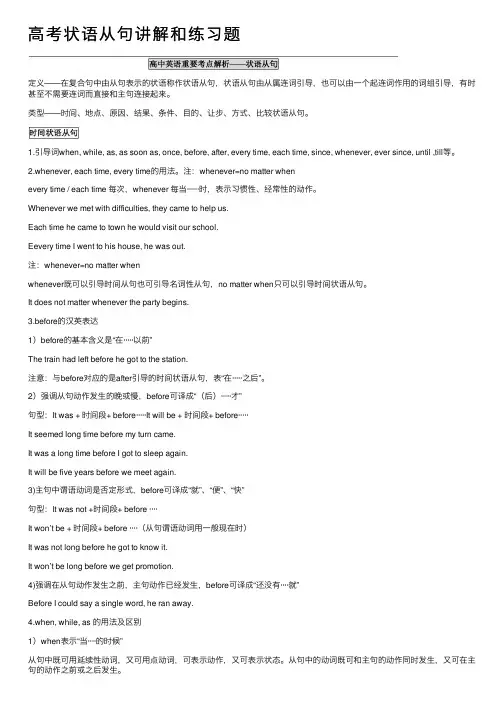
⾼考状语从句讲解和练习题定义——在复合句中由从句表⽰的状语称作状语从句,状语从句由从属连词引导,也可以由⼀个起连词作⽤的词组引导,有时甚⾄不需要连词⽽直接和主句连接起来。
类型——时间、地点、原因、结果、条件、⽬的、让步、⽅式、⽐较状语从句。
1.引导词when, while, as, as soon as, once, before, after, every time, each time, since, whenever, ever since, until ,till等。
2.whenever, each time, every time的⽤法。
注:whenever=no matter whenevery time / each time 每次,whenever 每当······时,表⽰习惯性、经常性的动作。
Whenever we met with difficulties, they came to help us.Each time he came to town he would visit our school.Eevery time I went to his house, he was out.注:whenever=no matter whenwhenever既可以引导时间从句也可引导名词性从句,no matter when只可以引导时间状语从句。
It does not matter whenever the party begins.3.before的汉英表达1)before的基本含义是“在·····以前”The train had left before he got to the station.注意:与before对应的是after引导的时间状语从句,表“在·····之后”。
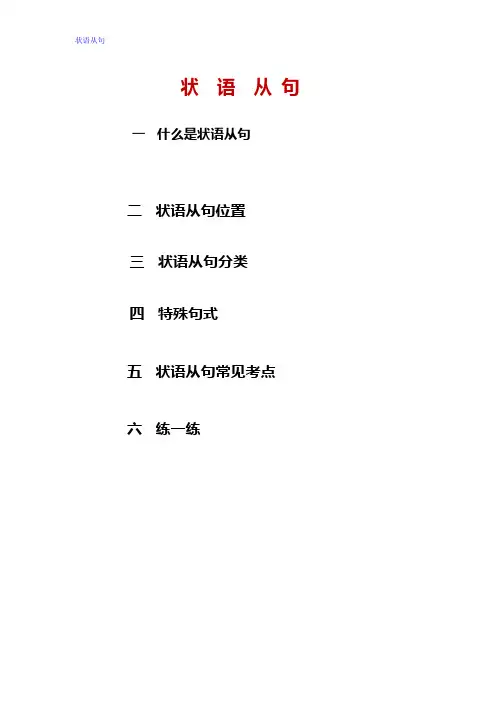
状语从句状语从句一什么是状语从句二状语从句位置三状语从句分类四特殊句式五状语从句常见考点六练一练一什么是状语从句状语从句是行使状语功能的从句,因为其作用相当于副词,它可以用来修饰谓语、定语、状语或整个句子。
状语从句通常由一个连接词或起连接词作用的词组引导。
二状语从句位置比较灵活,有时可以放于句首,有时可以置于句末。
状语从句位于句首时,其后常用逗号与后面的句子隔开。
三状语从句分类让步状语though, although, even though, while whether ,whoever/no matter who ,whatever/ n o m atter w hat ,whenever/ no matterEven t hough y ou s ay s o, I d o n ot believe it.比较状语 than as …as ,the more … the moreThe m ore I s ee him , t he l ess I l ike h im. 方式状语as, as if , as thoughHe t old m e e verything a s i f I w ere h isbest friend.四 特殊句式时间状语中 A:It + b e +时间点+ w hen …… 当某事发生时是什么时候It was 11:00 PM when he came back last night.B:It i s/has b een +时间段 + s ince …… 自从某事发生后已过了多久时间It i s /has b een t wo y ears s ince I e ntered t he t he s enior s chool.C:It + be +时间段 + before …… 在某事发生之前需要多久时间It was 8 years before we finally drove away the Japanese invaders. It m ight b e a l ong t ime b efore C hinese l and o n t he m oon.让步状语从句A: as 引导的让步状语从句, 从句的表语、状语必须前置到句首。
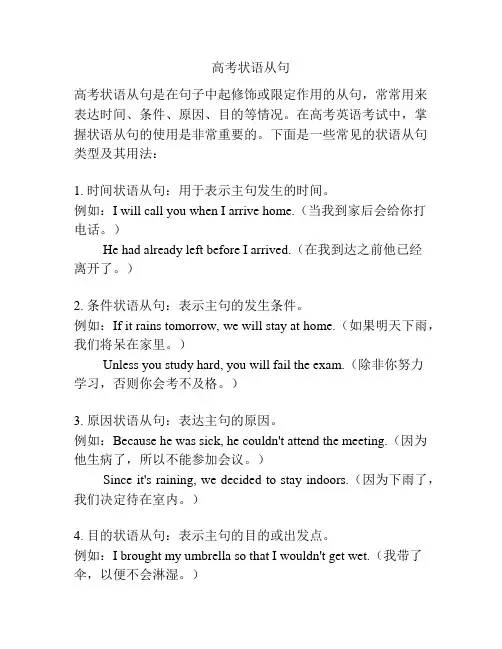
高考状语从句高考状语从句是在句子中起修饰或限定作用的从句,常常用来表达时间、条件、原因、目的等情况。
在高考英语考试中,掌握状语从句的使用是非常重要的。
下面是一些常见的状语从句类型及其用法:1. 时间状语从句:用于表示主句发生的时间。
例如:I will call you when I arrive home.(当我到家后会给你打电话。
)He had already left before I arrived.(在我到达之前他已经离开了。
)2. 条件状语从句:表示主句的发生条件。
例如:If it rains tomorrow, we will stay at home.(如果明天下雨,我们将呆在家里。
)Unless you study hard, you will fail the exam.(除非你努力学习,否则你会考不及格。
)3. 原因状语从句:表达主句的原因。
例如:Because he was sick, he couldn't attend the meeting.(因为他生病了,所以不能参加会议。
)Since it's raining, we decided to stay indoors.(因为下雨了,我们决定待在室内。
)4. 目的状语从句:表示主句的目的或出发点。
例如:I brought my umbrella so that I wouldn't get wet.(我带了伞,以便不会淋湿。
)He works hard in order that he can achieve his goals.(他努力工作以便能达到自己的目标。
)以上只是状语从句的几个常见用法,考生在备考过程中还需多加练习,加深对状语从句的理解和使用。
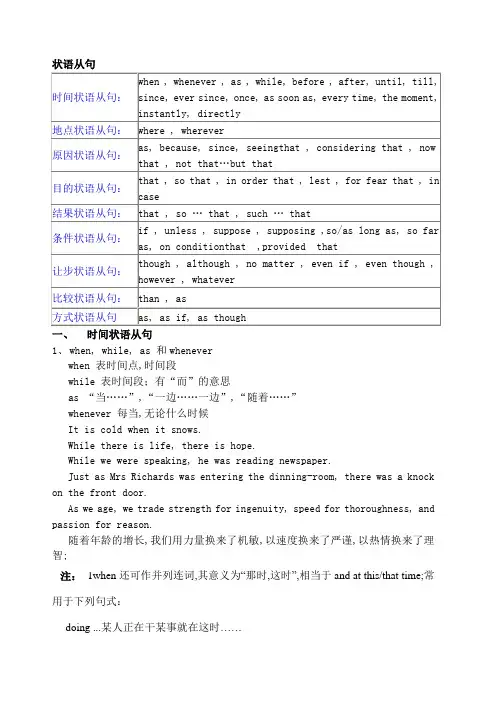
状语从句时间状语从句:when , whenever , as , while, before , after, until, till, since, ever since, once, as soon as, every time, the moment, instantly, directly地点状语从句:where , wherever原因状语从句:as, because, since, seeingthat , considering that , now that , not that…but that目的状语从句:that , so that , in order that , lest , for fear that , in case结果状语从句:that , so … that , such … that条件状语从句:if , unless , suppose , supposing ,so/as long as, so far as, on conditionthat ,provided that让步状语从句:though , although , no matter , even if , even though , however , whatever比较状语从句:than , as方式状语从句as, as if, as though一、时间状语从句1、when, while, as 和wheneverwhen 表时间点,时间段while 表时间段;有“而”的意思as “当……”,“一边……一边”,“随着……”whenever 每当,无论什么时候It is cold when it snows.While there is life, there is hope.While we were speaking, he was reading newspaper.Just as Mrs Richards was entering the dinning-room, there was a knock on the front door.As we age, we trade strength for ingenuity, speed for thoroughness, and passion for reason.随着年龄的增长,我们用力量换来了机敏,以速度换来了严谨,以热情换来了理智;注:1when还可作并列连词,其意义为“那时,这时”,相当于and at this/that time;常用于下列句式:doing ...某人正在干某事就在这时……about to/ going to do ...某人正打算干某事就在这时……has just done ...某人刚干了某事就在这时……2如果主句表示的是短暂动作,而从句用延续性动词的进行时态表示在一段时间内正在进行的动作时,when,while与as可互换使用;如:When/While/As I was walking down the street,I came across an old friend of mine.2、before/ afterIt will be five years before we meet again.五年之后我们才能见面;After you think it over, please let me know what you decide.After her husband had gone to work, she sent her children to school.3、until, till, not...until1)肯定句:主句的谓语是延续性动词,主从句均为肯定式,意为“某动作一直持续到某时间点才停止”Please wait until I come back.等我回来;2)否定句:主句的谓语是非延续性动作,从句为肯定式,意为“某动作一直到时间点才开始”He won’t go to be d till/until she returns.3)Till不可以用在句首,而until可以Until you told me I had no idea of it.4not…until句型中的强调和倒装用法It was not until you told me that I had any idea of it.Not until you told me did I have any idea if it.4、since从句谓语动词多用于一般过去时态,主句用现在完成时态或现在完成进行时态She has been working in this factory since she left school.I have written to Alice four times since I came here.It is +一段时间+since从句的句型中,时间计算一律从since从句动作完成或状态结束时算起It is three years since the war broke out. 战争爆发以来,有三年了;It is three years since she was in our class.她离开我们班有三年了;5、as soon as, immediately, directly, instantly, the moment/ minute/instant/ secondno sooner…than…, hardly/scarcely/barely…when…,“一……就”once一旦The moment I heard the voice, I know father was coming.Directly I had done it, I knew I hold made a mistake.The instant he saw me, he ran away.I had hardly got home when it began to rain.hardly/no sooner主句用过去完成时,when/than引导的从句用一般过去时,固定结构No sooner had we arrived at the station than the train left.6、by the time到……时候;到……之前从句用一般过去时,主句用过去完成时each/every time和the next timeBy the time I got outside, the bus had already left.Each time she came, Jane brought me a nice book.二、地点状语从句where或wherever/ anywhere/ everywhere1.Stay where you are.2.The photo of mine was taken where stood the famous high tower.3.Wherever you go, you can see new factories and stories.4.Everywhere you go, you will find the same thing.5.Where there is a will, there is a way.6.Plants will grow almost anywhere there is plenty of air, water andsunlight.判断:You’d better make a mark where you have questions.You’d better make a mark at the place where you have questions. 三、原因状语从句because/as由于/for/since既然/now that/seeing that/considering that…1)because强调原因,是句子较重要的部分,在很多情况下,不能用since,for 等替代;Henry didn’t go to the office because it was rain ing.He resigned partly because he was old and partly because he was bored with the work.I didn’t help, not because I was unwilling, but because I was unableto do it.2)as和since所提出的原因是已知的,或是句中不重要的部分,since较as 稍正式一些As his fat is in a large town, he has no garden of his own.Since you don’t trust him, you should not employ him.3)for,一种补充说明,而且for引导的句子不能放在句首,for是并列连词He seldom goes out now, for he is very old.4)not that…but that...“不是因为……而是因为……”It’s not that I’m dissatisfied, but that I have my own business to attend to.5 in that多出现主句之后;seeing that因为,鉴于;considering that因为,考虑到I like this place, but I like my hometown better in that I have more friends there.Seeing that/ since he was there, he may have seen her.That is excusable considering/ seeing that he is so young四、条状语从句1)真实条件从句:属性,习惯,推测,对未来的预测If you heat ice, it melts.If he is in London, he is undoubtedly staying at this hotel.If businessmen want to borrow money, they go to see their bank managers.If he breaks his promise, she’ll never speak to him again.2 非真实条件句:虚拟语气3if only引导状语从句,要用虚拟语气,“但愿,要……就好了”If only I had more money, I could buy a car. 对现在情况表示遗憾If only I had known it, I wouldn’t have troubled him. 对过去情况表示遗憾only if 只有,用陈述语气You’ll succeed only if you put all your heart into it.4 provided/ providing that“在……条件下”,“要是”,“以……为条件”on condition thatunder the condition thatsuppose/ supposing that“假定”,主句多是疑问句granted/ granting that “假定…….”,“就算是”,有浓厚的让步意义,可意为“姑且”given that…“假设”主要强调以假定的方式提出前提条件;I will come providing that I am well enough.I will go there on the condition that you accompany me.Supposing he can’t come, who will do the workGranted that you have made some progress, you should not be conceited. Given that this is true, what should we do5 as/ so long as… “只要”重点在于时间的延续性,从句可用现在时表将来;You may borrow this book as long as you keep it clean.6 unless“除非”,相当于“if…not…”,引导的从句不能用否定式I will go there tomorrow unless it rains.五、方式状语从句as “如,像”;as if=as though “好像,仿佛……似的”I live as others do.He looks as if he is angry.六、让步状语从句1、though, although, while, whereas, even if, even though “虽然,尽管”Though和 although两者意思相同,一般可互换使用,都可以与yet,still或nevertheless连用,但不能和but连用;Though/ Although it was raining hard, yet they went on playing football.Though I believe it, yet I must consider.While I like the style of the hat, I don’t like its color.强调对比和差异He thought I was lying, whereas I was telling the truth.Even though I were starving,I would not ask a favor of him.“即使”,有一种假想的可能性或推测,所以用虚拟语气2、whether…or not“不管……”Whether he comes or not, the results will be the same.3、whatever=no matter what, whichever=no matter whichWhoever, whomever, whosever, whenever, wherever, howeverStay calm whatever happens.Whenever he comes, he brings us some parents.Whichever side wins, I shall be satisfied.4、as, though, thatas引导的让步状语从句需要倒装Poor though he is, he is generous.Child that he was, he knew what was the right thing to do.Strange as this behavior may be, there is a very good reason for it. Try as he will, he never seems able to succeed.七、结果状语从句so+ adj./adv. +.that从句so+ adj.+a/an + 可数名词单数+that从句so many/ few/ much/ little +名词 + that从句such + a/an + adj. + 可数名词单数+ that从句such + adj. +可数名词复数/不可数名词 + that 从句such + a lot of/ lots of + 名词+that 从句The wind was so strong that he would hardly move forward.We have such difficult problems that no one would like to solve.He is such a lovely child that everybody loves him.He gave me so little time that it was impossible for me to finish the work on time.There are so many picture-story books that the boy won’t leave.so thatHe works hard every day, so that he gets the first prize in class.注意:当so或such置于句首,主句要用倒装语序;So clever a student was he that he was able to work out all the difficult problems.八、目的状语从句so that, in order that, to the end thatI stepped aside so that he would go in.lest, in case “免得,以免” ; for fear that,生怕She took the umbrella lest it should rain.There is some money in case you need it.Mary didn’t want get out of bed for fear that she might wake her baby up.九、比较状语从句as…as, not as/so…as, the same…as, such…as 和……一样more…than…, less…than…,the +比较级, the+比较级,This suggestion is as good as that one.Tom is as good a student as Jack =Tom is such a good student as Jack.The sooner, the better.More haste, less speed.在比较级中要,注意比较的对象要一致The weather in Shanghai is hotter than that in Beijing.The students in my class are more than those in yours.表达倍数, 可用三种形式This building is once taller than that one.This building is twice as tall as that one.This building is twice the height of that one.状语从句中的紧缩现象1 时间状语从句中常见的紧缩形式:Don’t speak until spoken to 有人对你说话时你才说;Once seen, it can never be forgotten. 一旦被看见,它便不会被忘记;While in Beijing, I paid a visit to the Summer Place. 在北京时,我参观了颐和园;Pressure can be reduced when needed. 必要时压力非唯心减;I prefer my milk a little sweet whenever possible.可能的话,我喜欢牛奶甜点;He was a swimmer when a child. 他小时侯就是一名游泳运动员;She always sings while doing her work. 她干活时总唱歌;2 条件状语从句中常见的紧缩形式:Come tomorrow if possible. 可能的话就明天来吧If so, you must get back and get it. 如果这样的话,你必需把它拿来;I’ll buy a TV set if necessary. 如有必要我们就买一台电视机;He has no money, if any, he will give us. 他没有钱,如果有他会给我们的;If in need, don’t hesitate to ask me for money.如要钱,不必犹豫,向我要就是了;The girl never give in unless wrong. 这女孩不会屈服的,除非她错了;Unless repaired, the machine is of no use. 这台机器如不修便毫无用处;3 方式状语从句中常见的紧缩形式:Some flowers shut up at night as if they did this in order to sleep.有些花夜间收拢,好象为了睡眠一样;The woman teacher hurriedly left the classroom as though she was angry.这位女教师匆匆茫茫离开教室,好象生气了;Jane seemed as if she was good at everything.琼好象擅长一切;4 其它状语从句的紧缩形式:Though cold, he still wore a shirt. 天气虽然冷,但他还穿一件衬衣;The man, while he is well over eighty. Can walk faster than I .这人虽然年过八十,却比我走得快;Being blind= As he was blind, he couldn’t see anything.他瞎了,什么东西也看不见;Fill in the blank with articles where necessary.在需要的地方填上冠词;真题演练1 2012全国卷I25. I don't believe we've met before, _______ I must say youdo look familiar.A. thereforeB. althoughC. sinceD. unless2 2012全国卷I29. This restaurant wasn't _______ that other restaurant we went to.A. half as good asB. as half good asC. as good as halfD. good as half as3 2012全国卷II11. I had hardly got to the office ___ my wife phone me togo back home at once.A. whenB. thanC. untilD. after4 2012北京卷21.—Look at those clouds—Don’t worry. ______ it rains, we’ll still have a great time.A. Even if though C. In case D. If only5 2012上海卷 32. I have a tight budget for the trip, so I'm not going tofly the airlines lower ticket prices.A. onceB. ifC. afterD. unless6 2012上海卷 40. The map is one of the best tools a man has he goesto a new place.A. wheneverB. whateverC. whereverD. however7 2012天津卷14. Everything was placed exactly ___________he wanted it for the graduation ceremony.A. whileB. whenC. whereD. though8 2012江苏卷30. One’s life has value ________ one brings value to the life of others.A. so thatB. no matter howC. as long asD. except that9 2012湖南卷28. ________ I always felt I would pass the exam, I never thought I would get an A.A. WhileB. OnceC. IfD.Until10 2012湖南卷32. ________ hard you try, it is difficult to lose weight without cutting down the amount you eat.A. HoweverB. WhateverC. WhicheverD. Whenever11 2012福建卷 is hard for the Greek government to get over the presentdifficulties ____ it gets more financial support from theEuropean Union.A. ifB. unlessC. becauseD. since12 2012陕西卷18. Hot _______ the night air was, we slept deeply because we were so tired after the long journey.A. althoughB. asC. whileD. however13 2012陕西卷25. All the photographs in this book, _______ stated otherwise, date from the 1950s.A. unlessB. untilC. onceD. if14 2012山东卷27. He smiled politely ______ Mary apologized for her drunkenfriends.A. asB. ifC. unlessD. though15 2012山东卷32. A number of high buildings have arisen _______ there wasnothing a year ago but ruins.A. whenB. whereC. beforeD. until16 2012重庆卷30. — Coach, can I continue with the training—Sorry, you can’t ________ you haven’t recovered from the knee injure.A. untilB. beforeC. becauseD. unless17 2012四川卷4. At school, some students are active ________ some are shy,yet they can be good friends with one another.A. whileB. althoughC. soD. as18 2012四川卷10. If you happen to get lost in the wild, you’d better stay________ you are and wait for help.A. whyB. whereC. whoD. what19 2012江西卷 can borrow my car you promise not to drive too fast.A.unless B.even if C.in case D.as longas20 2012浙江卷18. Mike was usually so careful, ______this time he made asmall mistake.A. yetB. stillC. evenD. thus21 2012辽宁卷30. Leave your key with your neighbor you lock yourselfout one day.A. as long asB. even thoughC. in caseD. as if2011年真题1.2011全国卷II19. It was a nice meal, _______a little expensive.A. thoughB. whetherC. asD. since2.2011北京卷29. __________ volleyball is her main focus, she’s also greatat basketball.A. SinceB. OnceC. UnlessD. While3. 2011上海卷 36. If a lot of people say a film is not good, I won’t botherto see it, or I’ll wait it comes out on DVD.A. whetherB. afterC. thoughD. until4.2011上海卷 37. The police officers in our city work hard _____ the restof us can live a safe life.A. in caseB. as ifC. in order thatD. only if5.2011江西卷29. Please call my secretary to arrange a meeting thisafternoon, or it is convenient to you.A. wheneverB. howeverC. whicheverD. wherever6.2011浙江卷4. One Friday, we were packing to leave for a weekend awaymy daughter heard cries for help.A. afterB. whileC. sinceD. when7.2011福建卷 was April 29, 2001 Prince William and Kate Middletonwalked into the palace hall of the wedding ceremony.8.2011四川卷4. Frank insisted that he was not asleep I had great difficulty in waking him up.A. whetherB. althoughC. forD. so9.2011四川卷6. As it reported, it is 100 years _____________Qinghua University was founded.A. whenB. beforeC. afterD. since10.2011辽宁卷25. No matter how ________ , it is not necessarily lifeless.A. a desert may be dryB. dry a desert may beC. may a desert be dryD. dry may a desert be11.2011辽宁卷29. He had no sooner finished his speech _____ the students started cheering.A. sinceB. asC. whenD. than12.2011陕西卷 new stadium being built for the next Asian Games will be______the present one.A. as three times big asB. three times as big asC. as big as three timesD. as big three times as13.2011天津卷5. reg ular exercise is very important, it’snever a good idea to exercise too close to bedtime.B. As14.2011陕西卷 of them are strong candidates, only one will be chosen forthe post.A. SinceB. WhileC. IfD. As15.2011重庆30 Toshowourrespect,weusuallyhavetotakeourglovesoff weareto shakehandswith.16. 2011湖南卷33Jackwasn’tsayinganything,buttheteachersmiledathim_______hehaddonesomethingveryclever.17. 2011山东卷28Hehadhiscameraready_____hesawsomethingthatwouldmakeagoodpicture.A.evenifB.ifonlyC.incaseD.sothat。
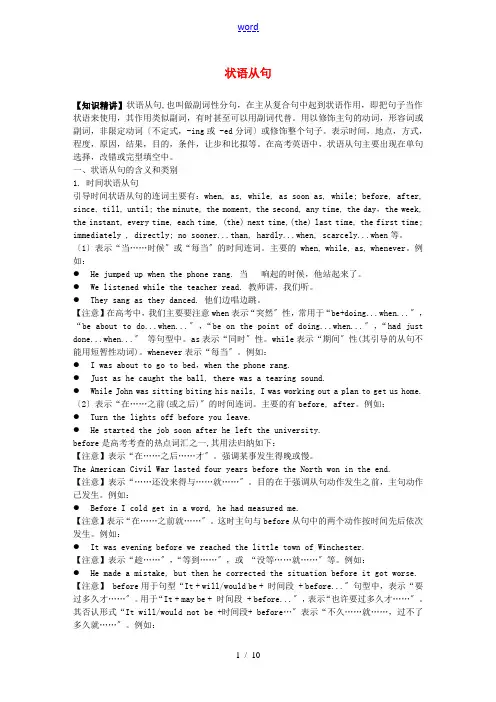
状语从句【知识精讲】状语从句,也叫做副词性分句,在主从复合句中起到状语作用,即把句子当作状语来使用,其作用类似副词,有时甚至可以用副词代替。
用以修饰主句的动词,形容词或副词,非限定动词〔不定式,-ing或 -ed分词〕或修饰整个句子。
表示时间,地点,方式,程度,原因,结果,目的,条件,让步和比拟等。
在高考英语中,状语从句主要出现在单句选择,改错或完型填空中。
一、状语从句的含义和类别1. 时间状语从句引导时间状语从句的连词主要有:when, as, while, as soon as, while; before, after, since, till, until; the minute, the moment, the second, any time, the day,the week, the instant, every time, each time, (the) next time,(the) last time, the first time; immediately , directly; no sooner...than, hardly...when, scarcely...when等。
〔1〕表示“当……时候〞或“每当〞的时间连词。
主要的 when, while, as, whenever。
例如:●He jumped up when the phone rang. 当响起的时候,他站起来了。
●We listened while the teacher read. 教师讲,我们听。
●They sang as they danced. 他们边唱边跳。
【注意】在高考中,我们主要要注意when表示“突然〞性,常用于“be+doing...when...〞,“be about to do...when...〞,“be on the point of doing...when...〞,“had just done...when...〞等句型中。
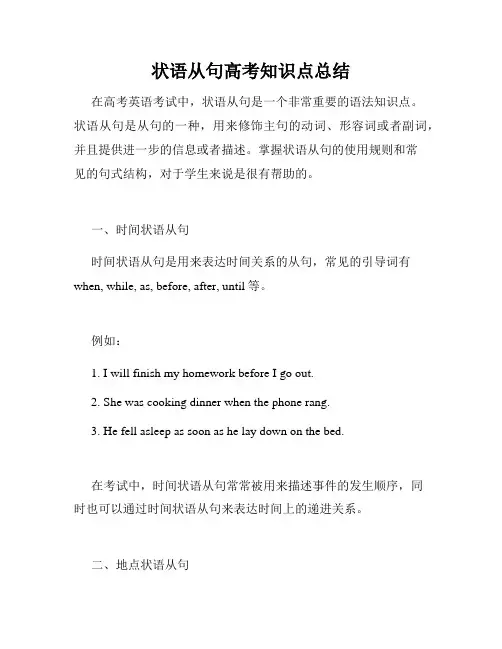
状语从句高考知识点总结在高考英语考试中,状语从句是一个非常重要的语法知识点。
状语从句是从句的一种,用来修饰主句的动词、形容词或者副词,并且提供进一步的信息或者描述。
掌握状语从句的使用规则和常见的句式结构,对于学生来说是很有帮助的。
一、时间状语从句时间状语从句是用来表达时间关系的从句,常见的引导词有when, while, as, before, after, until等。
例如:1. I will finish my homework before I go out.2. She was cooking dinner when the phone rang.3. He fell asleep as soon as he lay down on the bed.在考试中,时间状语从句常常被用来描述事件的发生顺序,同时也可以通过时间状语从句来表达时间上的递进关系。
二、地点状语从句地点状语从句是用来表示事件发生的地点的从句,常见的引导词有where, wherever等。
例如:1. I will follow you wherever you go.2. She looked around, trying to find out where the noise was coming from.在高考中,地点状语从句可以用来描述人们在不同的场所进行各种活动,增强语言表达的准确性和丰富性。
三、原因状语从句原因状语从句是用来表示某个事件的原因或者理由的从句,常见的引导词有because, since, as, for等。
例如:1. He couldn't come to the party because he was busy with his work.2. Since it's raining outside, we can't have a picnic in the park.高考中,原因状语从句常常被使用在写作文的时候,可以帮助学生更好地陈述事实和论证观点。
高考英语状语从句语法知识点梳理(名师总结基础语法知识点,值得下载)结构图概述时间状语从句的用法:1、2、3、4、5、6、7状语从句 地点状语从句的用法:原因状语从句的用法:1、2、3、4 条件状语从句的用法:1、2用法 方式状语从句的用法:让步状语从句的用法:1、2、3目的状语从句的用法:结果状语从句的用法:1、2、3 比较状语从句的用法:1、2、3、4、5、6一、概述:状语从句修饰主句中的动词、形容词、副词等,在复合句中作状语。
引导状语从句的关联词是从属连词。
状语从句用陈述句语序,一般位于复合句的句首或句末。
当从句放在主句前面时,常用逗号与主句隔开。
状语从句根据其在句中的不同作用可以分为时间、地点、原因、目的、结果、条件、让步、方式和比较状语从句九种。
二、用法:(一)时间状语从句的用法:1、注意点:⑴在时间、条件状语从句中,谓语动词一般不用将来时态表示将来,而用一般现在时态代替将来时态,用一般过去时态代替过去将来时态,用现在完成时态代替将来完成时态。
如:When he comes here,I will let you know. When I have finished reading the book,I will tell you.⑵if可以引导条件状语从句和宾语从句,引导条件状语从句时,意为“如果,假如”,引导宾语从句时,意为“是否”。
如:If he has any questions,he will come to ask me. Tell me if you will go to school tomorrow.⑶时间、条件、方式、让步等状语从句常常可以转换成省略形式或简单句句子成分。
①when,while,as,if,though,as if等引导时间、条件、方式、让步等状语从句时,若从句和主句的主语一致或主句的主语是it且含有be动词时,可以将从句中的主语连同后面的be动词一起省略。
高考英语状语从句的用法归纳一、概说状语从句即指在主从复合句用作状语的从句。
按照其意义,状语从句可分为时间状语从句、地点状语从句、原因状语从句、目的状语从句、结果状语从句、条件状语从句、让步状语从句等。
状语从句是高中英语学习中的一个语法重点,也是历年高考重点考查的内容之一。
学习状语从句主要应注意引导状语从句的从属连词的用法与区别,以及从属连词在一定的语言环境中的意义与用法。
二、时间状语从句1. 引导时间状语从句的从属连词很多,常见的有before, after, when, while, as, since, till, until, as soon as 等。
2. 表示“当…时候”的 while, when, as 的用法区别是:while从句中的谓语动词必须是延续性动词;表示带有规律性的“每当”或当主、从句谓语动词的动作发生有先后时,只能用 when;当表示“一边…一边…”或“随着”时,只能用 as。
另外,用于此义的 as 所引导的时间状语从句谓语只能是动作动词,不能是状态动词。
如下面一道高考题的答案是 B 而不能是A:“I’m going to the post office.” “_____ you’re there, can you get me some stamps?”A. AsB. WhileC. BecauseD. If3. until 在肯定句中通常只连用延续性动词,表示相应动作结束的时间;在否定句中通常连用非延续性动词,表示相应动作开始的时间,意为“直到…才”。
如:He waited until she was about to leave. 他等着一直到她准备离开。
I did not begin to work till he had gone. 他走了后我才开始工作。
4. 表示“一…就”除用 as soon as 外,还可用 the minute, the second, the instant, immediately, directly, instantly, no sooner…than, hardly…when 等。
高考状语从句一、状语从句的定义与作用状语从句在句子中起副词作用,用来修饰主句中的动词、形容词、副词或整个句子。
它可以表示时间、地点、原因、条件、让步、比较、方式、目的等不同的意义。
二、常见类型及用法1. 时间状语从句- 引导词:when(当……时候),while(在……期间,强调同时性),as (当……;随着),before(在……之前),after(在……之后),since(自从;既然),until/till(直到)等。
- 例如:- When I got home, my mother was cooking.(当我到家的时候,我妈妈正在做饭。
)- While I was reading, he was watching TV.(我读书的时候,他正在看电视。
这里强调读书和看电视这两个动作同时进行)- As we grow older, we become wiser.(随着我们长大,我们变得更聪明了。
)- Before you leave, turn off the lights.(在你离开之前,关灯。
)- After he had finished his homework, he went to bed.(他完成作业之后就去睡觉了。
注意这里从句动作先于主句动作完成,用过去完成时)- Since I came to this school, I have made many friends.(自从我来到这所学校,我交了很多朋友。
since引导的从句常用一般过去时,主句用现在完成时) - He didn't leave until/till his mother came back.(直到他妈妈回来他才离开。
)2. 地点状语从句- 引导词:where(在……地方),wherever(无论在哪里)。
- 例如:- Put the book where you can find it easily.(把书放在你容易找到的地方。
高考英语语法复习状语从句知识讲解一、概述常见的有although/though/even though引导的让步状语从句。
if/unless引导的条件状语从句。
until/when/while/as soon as引导的时间状语从句。
because引导的原因状语从句,so that引导的目的状语从句等。
if引导的条件状语从句和when引导的时间状语从句一般都会和时态相结合,即主要考查“主将从现”原则。
对于状语从句的学习可与专题六从属连词相结合。
在时间状语从句和条件状语从句中,主句和从句的时态一致问题一般有两种情况:(1)“主将从现”:主句用一般将来时,而从句用一般现在时。
常见的使用“主将从现”原则的连词有:表示时间的when, while, after, before, until, till, whenever, as soon as, as long as, once 等;表示条件的if, unless, so long as, in case等。
(2)“主祈从现”:若主句是祈使句,或主句中有情态动词时,那么从句用一般现在时表示将来。
(3)“主情从现”:若主句有情态动词, 那么从句用一般现在时表示将来。
如:You can get good grades if you study hard.如果你努力学习,你将取得好成绩。
状语从句由从属连词引导,与主句连接,位于句首时,常用逗号与主句分开,位于句末时,其前一般不用逗号。
状语从句根据其用途可分为时间状语从句、条件状语从句、原因状语从句、目的状语从句、结果状语从句、让步状语从句、比较状语从句、地点状语从句等。
二、时间状语从句(1)当主句是一般将来时态或祈使句,表示将来的意义时,从句通常用一般现在时,简称“主将从现”。
I’ll ring you up as soon as I get to Beijing.我一到北京就给你打电话。
(2) when引导的时间状语从句,通常表示主句和从句的动作同时发生;before表示主句的动作发生在从句的动作之前;after则表示主句的动作发生在从句的动作之后;as引导时间状语从句时,往往表示主句和从句的动作同时发生,不分先后。
高考英语状语从句语法知识点与学习方法听、说、读、写是学习英语的正确挨次,但在传统英语教学中,听和说往往被忽视,课堂上注意的是应试力量,但这并不提倡。
状语从句学问点有哪些呢?我整理了相关资料,盼望能关心到您。
一、时间状语从句1、when的用法(1)when既可引导一个持续性动作,也可引导一个短暂性动作,可用于表示主句和从句动作同时发生或从句动作先于主句动作,有时还可表示从句动作后于主句,意为“当。
时候”。
(2)when在be about to do。
when。
,be doing。
when。
,had done。
when。
,be on ones way。
when。
,be on the point of doing。
when。
等结构中,作“那时突然”讲。
(3)when “既然、鉴于;尽管,虽然(位于主句之后);假如”2、while的用法(1)表示“当。
时候”,引导的动作必需是连续性的。
(2)用作并列连词,表示相对关系“然而”。
(3)引导让步状语从句,相当于although,意为“虽然”,位于主句前。
(4)引导条件状语从句,相当于as/so long as,意为“只要”。
3、as 的用法(1)表示“当。
时候”,强调同时发生,不指先后。
(2)说明两种正在进展或变化的状况,表示“随着”,表示时间的推移。
(3)表示“一边。
一边。
”。
(4)强调两个动作紧接着发生。
(5)表示“虽然,尽管”。
(6)其他含义“正如,正像”,“作为”,“由于,由于”。
4、before的用法(1)一般意为“在。
之前”“。
才”,“。
就”“还没有。
”“免得”“不知不觉”“宁可,宁愿”,“否则,要不然”。
(2)It + will be/was + 时间段+before+一般现在时/一般过去时。
在确定句中,意为“多长时间之后才”;在否定句中,意为“用不了多长时间就”。
5、until和till(1)与确定句连用,必需是连续性动词。
(2)与否定句连用,必需是非连续性动词,表示“直到。
高考状语从句知识点状语从句是高考英语中的一个重要语法点,掌握好状语从句对于理解和运用英语句子结构、提高英语语言能力有着至关重要的作用。
接下来,让我们一起深入了解一下高考中常见的状语从句类型及其用法。
一、时间状语从句时间状语从句表示时间关系,常用的引导词有 when(当……时候)、while(在……期间)、as(当……时;一边……一边……)、before(在……之前)、after(在……之后)、since(自从……)、until / till(直到……)等。
1、 when 引导的时间状语从句When I was a child, I often played in the park(当我还是个孩子的时候,我经常在公园玩耍。
)When he arrived home, it was already midnight(当他到家时,已经是午夜了。
)需要注意的是,when 引导的从句动作可以与主句动作同时发生,也可以先于主句动作发生。
2、 while 引导的时间状语从句While I was doing my homework, my mother was cooking(当我在做作业时,妈妈在做饭。
)While he was reading, his sister was singing(他在读书时,他妹妹在唱歌。
)while 引导的从句动作通常是持续性的,且主句和从句动作同时发生。
3、 as 引导的时间状语从句As I was walking along the street, I met an old friend(当我沿着街道走时,遇到了一位老朋友。
)As time goes by, we become more mature(随着时间的流逝,我们变得更加成熟。
)4、 before 和 after 引导的时间状语从句I had finished my homework before my father came back(在我爸爸回来之前,我已经完成了作业。
状语从句时间状语从句:when , whenever , as , while, before , after, until, till, since, ever since, once, as soon as, every time, the moment, instantly, directly地点状语从句:where , wherever原因状语从句:as, because, since, seeing(that) , considering (that) , now that , n ot that…but that 目的状语从句:that , so that , in order that , lest , for fear that , in case结果状语从句:that , so … that , such … that条件状语从句:if , unless , suppose , supposing ,so/as long as, so far as, on condition(that ) ,provided ( that )让步状语从句:though , although , no matter , even if , even though , however , whatever比较状语从句:than , as方式状语从句as, as if, as though一、时间状语从句1、when, while, as 和wheneverwhen 表时间点,时间段while 表时间段;有“而”的意思as “当……”,“一边……一边”,“随着……”whenever 每当,无论什么时候It is cold when it snows.While there is life, there is hope.While we were speaking, he was reading newspaper.Just as Mrs Richards was entering the dinning-room, there was a knock on the front door.As we age, we trade strength for ingenuity, speed for thoroughness, and passion for reason.随着年龄的增长,我们用力量换来了机敏,以速度换来了严谨,以热情换来了理智。
注:1)when还可作并列连词,其意义为“那时,这时”,相当于and at this/that time。
常用于下列句式:sb.was doing sth.when...某人正在干某事就在这时……sb.was about to/ going to do sth.when...某人正打算干某事就在这时……sb.body has just done sth.when...某人刚干了某事就在这时……2)如果主句表示的是短暂动作,而从句用延续性动词的进行时态表示在一段时间内正在进行的动作时,when,while 与as可互换使用。
如:When/While/As I was walking down the street,I came across an old friend of mine.2、before/ afterIt will be five years before we meet again.五年之后我们才能见面。
After you think it over, please let me know what you decide.After her husband had gone to work, she sent her children to school.3、until, till, not...until1)肯定句:主句的谓语是延续性动词,主从句均为肯定式,意为“某动作一直持续到某时间点才停止”Please wait until I come back.等我回来。
2)否定句:主句的谓语是非延续性动作,从句为肯定式,意为“某动作一直到时间点才开始”He won’t go to bed till/until she returns.3)Till不可以用在句首,而until可以Until you told me I had no idea of it.4)not…until句型中的强调和倒装用法It was not until you told me that I had any idea of it.Not until you told me did I have any idea if it.4、since从句谓语动词多用于一般过去时态,主句用现在完成时态或现在完成进行时态She has been working in this factory since she left school.I have written to Alice four times since I came here.It is +一段时间+since从句的句型中,时间计算一律从since从句动作完成或状态结束时算起It is three years since the war broke out. 战争爆发以来,有三年了。
It is three years since she was in our class.她离开我们班有三年了。
5、as soon as, immediately, directly, instantly, the moment/ minute/ instant/ secondno sooner…than…, hardly/scarcely/barely…when…,“一……就”once(一旦)The moment I heard the voice, I know father was coming.Directly I had done it, I knew I hold made a mistake.The instant he saw me, he ran away.I had hardly got home when it began to rain.hardly/no sooner主句用过去完成时,when/than引导的从句用一般过去时,固定结构No sooner had we arrived at the station than the train left.6、by the time到……时候;到……之前(从句用一般过去时,主句用过去完成时)each/every time和the next timeBy the time I got outside, the bus had already left.Each time she came, Jane brought me a nice book.二、地点状语从句where或wherever/ anywhere/ everywhere1.Stay where you are.2.The photo of mine was taken where stood the famous high tower.3.Wherever you go, you can see new factories and stories.4.Everywhere you go, you will find the same thing.5.Where there is a will, there is a way.6.Plants will grow almost anywhere there is plenty of air, water and sunlight.判断:You’d better make a mark where you have questions.You’d better make a mark at the place where you have questions.三、原因状语从句because/as由于/for/since既然/now that/seeing that/considering that…1)because强调原因,是句子较重要的部分,在很多情况下,不能用since,for等替代。
Henry didn’t go to the office bec ause it was raining.He resigned partly because he was old and partly because he was bored with the work.I didn’t help, not because I was unwilling, but because I was unable to do it.2)as和since所提出的原因是已知的,或是句中不重要的部分,since较as稍正式一些As his fat is in a large town, he has no garden of his own.Since you don’t trust him, you should not employ him.3)for,一种补充说明,而且for引导的句子不能放在句首,for是并列连词He seldom goes out now, for he is very old.4)not that…but that...“不是因为……而是因为……”It’s not that I’m dissatisfied, but that I have my ow n business to attend to.5) in that多出现主句之后;seeing that因为,鉴于;considering that因为,考虑到I like this place, but I like my hometown better in that I have more friends there.Seeing that/ since he was there, he may have seen her.That is excusable considering/ seeing (that) he is so young四、条状语从句1)真实条件从句:属性,习惯,推测,对未来的预测If you heat ice, it melts.If he is in London, he is undoubtedly staying at this hotel.If businessmen want to borrow money, they go to see their bank managers.If he breaks his p romise, she’ll never speak to him again.2) 非真实条件句:虚拟语气3)if only引导状语从句,要用虚拟语气,“但愿,要……就好了”If only I had more money, I could buy a car. (对现在情况表示遗憾)If only I had known it, I wouldn’t have troubled him. (对过去情况表示遗憾)only if 只有,用陈述语气You’ll succeed only if you put all your heart into it.4) provided/ providing (that)“在……条件下”,“要是”,“以……为条件”on condition (that)under the condition (that)suppose/ supposing (that)“假定”,主句多是疑问句granted/ granting (that) “假定…….”,“就算是”,有浓厚的让步意义,可意为“姑且”given that…“假设”主要强调以假定的方式提出前提条件。